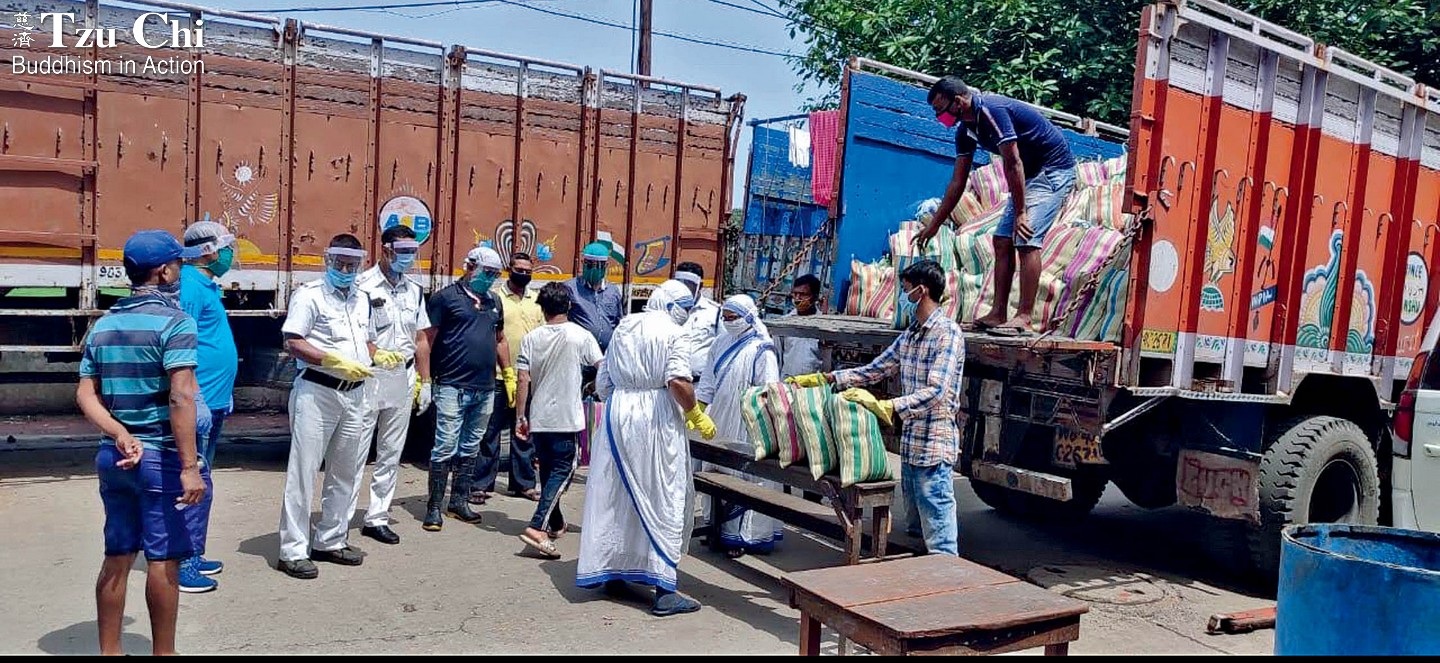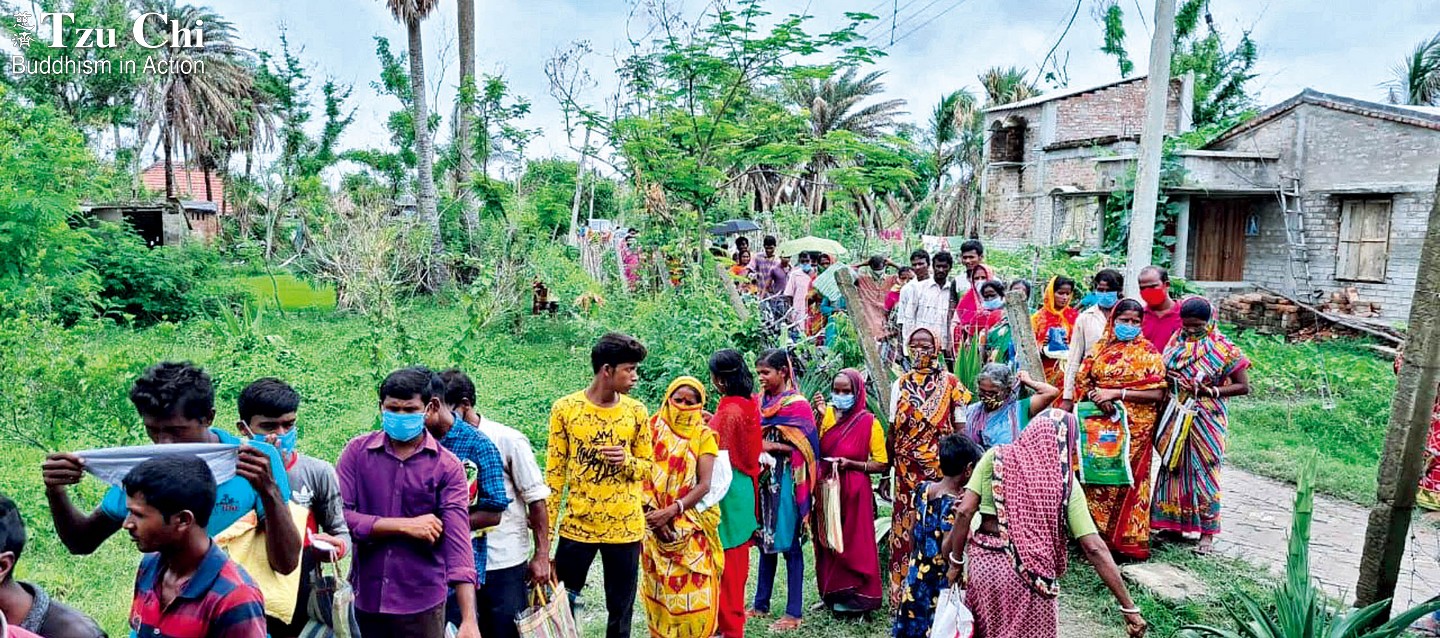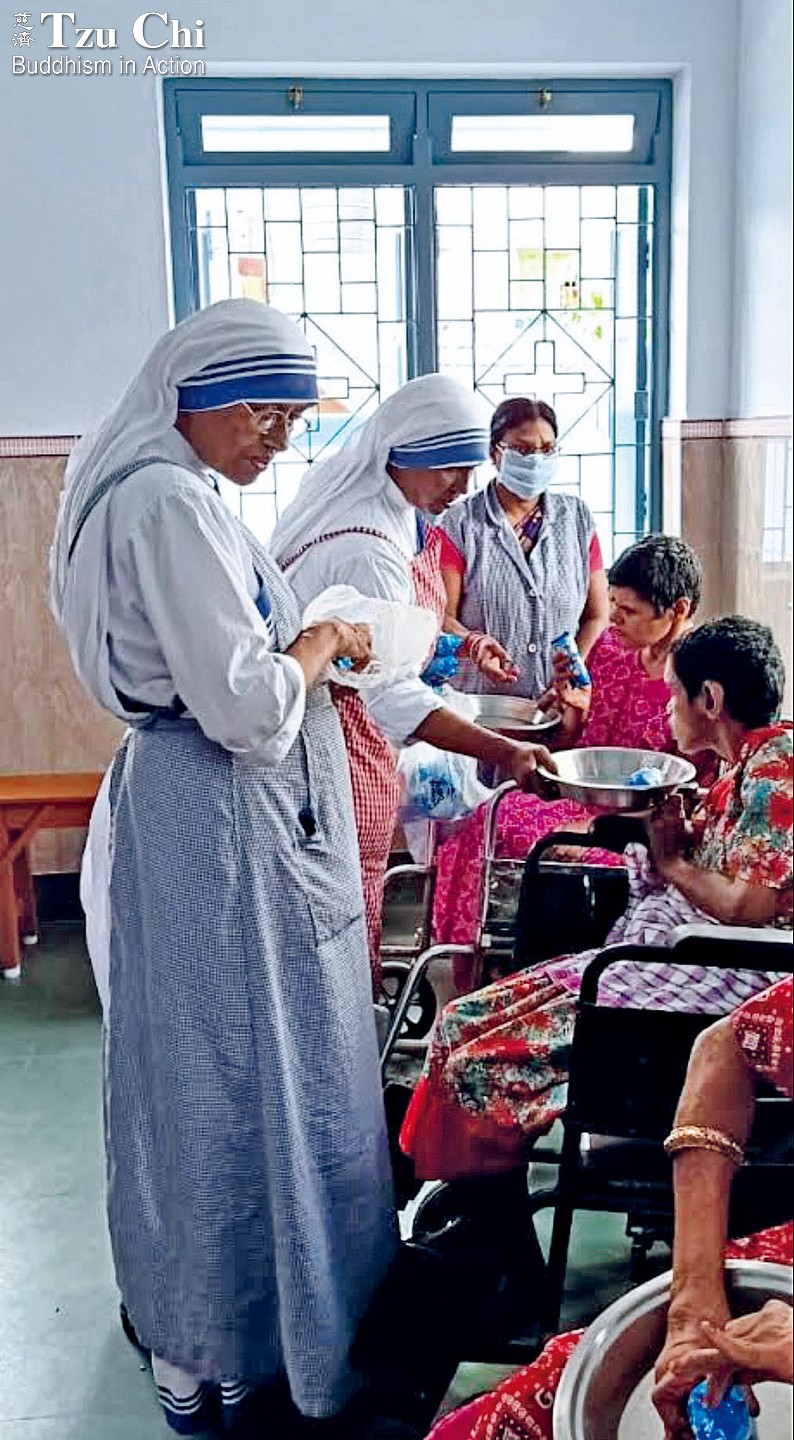Narrated by Huang Jing En
Compiled by Tzu Chi Monthly editorial staff
Edited and translated by Wu Hsiao-ting
The streets are full of destitute people in need of help. Despite the overwhelming need, these Catholic nuns do their best, meeting the suffering where they are, giving them aid to help them survive the pandemic.

Tzu Chi sent flour, rice, millet, and over 10,000 medical masks to nuns at the Missionaries of Charity, who subsequently distributed the aid to the needy in India.
Father, have you taken time to rest?” I asked the priest. He replied, “What is rest? Rest is a luxury to us.”
“It’s hot. Be sure to drink plenty of water,” I added. He responded, “We will, but the longer we rest, the longer the line of people needing help will grow. We must get the aid out as quickly as possible.”
I’m a staffer at the Tzu Chi Foundation CEO Office in Hualien, Taiwan. In May and June 2020, I participated in video conferences with Father Baby Ellickal, M.I., head of the Camillians in India. During those conversations, I learned that despite sweltering temperatures reaching nearly 50 degrees Celsius (122 degrees Fahrenheit), the Camillians, an Italian Catholic missionary order, were still going out in their clerical habits to distribute aid to the needy. The Camillians in India were carrying out a relief project with Tzu Chi to help underprivileged people there survive the pandemic. The project was launched in April, but by the end of May, the impoverished in India had increased six-fold. This rapid increase was the result of the pandemic and the measures enacted to prevent its spread.
Father Ellickal said that the longer the lockdowns in India lasted, the harder it would be for people there to make a living. At the same time, however, he realized that the number of infections would spike without lockdowns, and that it would be the underprivileged who would bear the brunt of those infections. The poor were in a no-win situation. He stressed that even though they couldn’t help everyone in need, they would do their best. They had enlisted the help of Catholic and other Christian sectors in India to serve the poor together.
The Camillians, working with Tzu Chi, distributed three months’ worth of food to 80,000 people from April to August. I was full of gratitude every time we had a video conference with the Camillians. I was impressed by their spirit of service and their dedication to help the needy. The same spirit of selfless service was also evident among the sisters of the Missionaries of Charity, another Catholic order working in partnership with Tzu Chi to deliver COVID aid to the underserved in India. The sisters told us that no matter what aid goods they received, the poor would always be the first to benefit. Only if there were leftovers would they consider their own needs.
The sisters said they were confronted by an endless supply of poor people on the street the moment they stepped out of their church. Many were homeless and didn’t have a penny to their name; they had nothing but the tattered clothes on their backs. If they were old or sick—or both—their plight was even worse. Elderly folks whose families were unable to care for them were left on the streets to fend for themselves. In this world of endless need, even children saw no future for themselves.
The sisters opened their doors every day to long lines of people who had come in hope of receiving some food, no matter the amount. “We can’t pretend that we don’t see or hear them,” said a sister. “Even though the streets are chock-full of poor people like them, too numerous to be aided, we must do what we can to help.”
Given the circumstances, the nuns felt that the aid from Tzu Chi was the best gift they could receive—it was as if they had received a tremendous blessing from God. They met to discuss how to get the food supplies to the needy and decided to go out into the streets every day to make distributions.
Since India was in the middle of a rampant pandemic, we asked them why they insisted on going out into the streets to make the distributions. They answered, “Because that’s where the poorest people are. We can’t afford not to go there.”

Hungry people in the countryside in India line up to receive food distributed by nuns from the Missionaries of Charity.
Calcutta is huge, and some remote areas are only accessible by boat. When the sisters were visiting these remote areas to bring aid to the needy there, some people gave away their seats on a boat so that the sisters could cross the river along with their supplies. When the supplies were offloaded, local villagers helped the nuns haul them manually by cart to the distribution site.
The sisters conducted their distributions carefully, wearing protective gear. Despite their precautions, 12 of them were suspected to have contracted the coronavirus, and two passed away. Their fellow nuns said that the two sisters had passed on without regrets, and that in Heaven they would continue to pray for everyone.
The nuns told us they believed that the Tzu Chi volunteers were angels sent by God. They said that Master Cheng Yen, the founder of the Tzu Chi Foundation, and Mother Teresa, the founder of the Missionaries of Charity, were both significant religious figures in modern times, bringing light to a dark world of suffering people. What the sisters said brought to mind something Father Ellickal, of the Camillians, once said. He told us that the love of Master Cheng Yen and Tzu Chi was like a lamp shining across the dark world of underprivileged people in India. He said that every time they distributed Tzu Chi’s aid to the poor, they saw suffering in its numerous forms: elderly people with no one to care for them; women whose husbands had died and left them struggling to support their families; untouchables who struggled on the verge of survival. Father Ellickal hoped that the cross-religion cooperation between Tzu Chi and the Camillians could continue and that the two organizations could together bring the love of God and the Buddha to more needy people, fulfilling the ideal of “all for one, one for all.”
When the pandemic led to lockdowns around the world, Master Cheng Yen said that even though Tzu Chi volunteers couldn’t personally reach some countries in the world during this difficult time, the foundation should still try to get its aid to people in those countries by working with humanitarian or medical organizations the foundation had worked with before. That was why Tzu Chi personnel had sought out Médecins du Monde (Doctors of the World) and with their help sent COVID aid to 26 countries, including South Sudan, Benin, Iraq, and Madagascar. Volunteers in Thailand and Malaysia had long worked with the United Nations High Commissioner for Refugees to help displaced people in those countries. The UN refugee agency helped Tzu Chi carry out its COVID aid project too.
It has not been easy for our foundation to pull off the aid project. Challenges have abounded at every step of the process. Despite the difficulties, we have kept in mind the plight of the needy and pulled out all the stops to enable our aid to reach them.
Tzu Chi’s preliminary plan was to provide the destitute in India with six months’ worth of food supplies, but Master Cheng Yen has instructed that as long as the pandemic persists, Tzu Chi will continue its aid to those affected. We sincerely hope that the love from all the kind-hearted donors in the world will help the poorest people in the world ride out this crisis.

When sisters of the Missionaries of Charity distributed aid on the streets and in villages and saw sick people living out in the open air, they brought them back to their convent and cared for them—after first making sure they were not COVID-19 patients.



